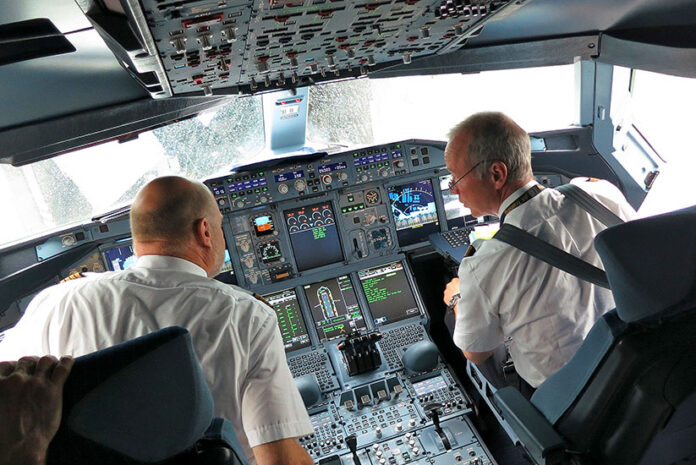In the realm of aviation, where the skies are the canvas and aircraft are the brushstrokes, the power of collaboration and communication is undeniable. Crew Resource Management (CRM) stands as a beacon of unity, enhancing the synergy among aviation professionals and fortifying the bonds that ensure safe and efficient flights. Join us as we delve into the world of Crew Resource Management, exploring how this practice elevates teamwork, communication, and safety in the aviation industry.
The Symphony of the Skies: The Essence of Crew Resource Management
In the fast-paced and high-stakes environment of aviation, effective teamwork and communication are more than just assets – they are imperative for safe and successful operations. Crew Resource Management (CRM) is the practice that empowers aviation professionals to work together seamlessly, leveraging their collective expertise and insights to make split-second decisions, solve complex problems, and navigate challenging situations.
A Journey Through Aviation History: The Genesis of CRM
The roots of CRM trace back to the aviation industry’s recognition of the role of human factors in accidents. In the 1970s, a series of incidents highlighted the importance of crew coordination, communication, and decision-making. CRM emerged as a response to these challenges, aiming to equip crews with the skills needed to effectively collaborate and manage risks.
Principles of CRM: Building Blocks of Success
At its core, CRM is built upon a set of principles that guide aviation professionals in their interactions and decision-making processes. Communication, leadership, situational awareness, and decision-making form the pillars that underpin effective CRM practices.
Communication: The Art of Effective Dialogue
Open and clear communication is the bedrock of CRM. Flight crews and aviation personnel must communicate with precision and transparency, ensuring that critical information is relayed accurately and promptly. Effective communication fosters a shared understanding of the flight’s status, challenges, and objectives.
Leadership and Followership: Dynamic Roles in the Cockpit
CRM recognizes that leadership is not confined to the captain; it’s a shared responsibility among all crew members. Effective leaders encourage input from all team members, fostering an environment where everyone feels empowered to contribute their expertise. Conversely, effective followership involves actively participating in discussions, voicing concerns, and offering suggestions when necessary.
Situational Awareness: The Power of Perception
Situational awareness is the ability to perceive and understand the current state of the aircraft, its surroundings, and potential risks. CRM emphasizes the importance of maintaining situational awareness, allowing crews to make informed decisions based on accurate assessments of the situation.
Decision-Making: Navigating the Unknown
In the aviation industry, decisions must often be made swiftly and decisively. CRM equips crews with decision-making tools that encourage evaluating options, seeking input from team members, and prioritizing safety. By involving multiple perspectives, CRM enhances the quality of decisions.
Training and Integration: Cultivating CRM Competence
Effective CRM requires training, practice, and continuous improvement. Aviation professionals undergo CRM training programs that simulate various scenarios, allowing them to experience real-world challenges in a controlled environment. Integrating CRM into training curricula ensures that aviation personnel are equipped to apply these principles in high-pressure situations.
Real-World Applications: CRM in Action
CRM shines brightest when put into practice. From flight deck to cabin, and from air traffic control to ground operations, CRM enhances collaboration and communication across the aviation ecosystem. In the cockpit, it ensures that pilots work together seamlessly to manage the aircraft’s systems, communicate with air traffic control, and make coordinated decisions.
The Cabin Crew Connection: Communication Beyond the Cockpit
CRM extends beyond the flight deck to the cabin, where cabin crews play a pivotal role in ensuring passenger safety and comfort. Effective communication between the flight deck and cabin crews is crucial for sharing critical information, addressing potential issues, and managing emergencies.
CRM Challenges: Addressing Cultural Barriers and Hierarchies
While CRM has transformed aviation by promoting teamwork and open communication, challenges persist. Hierarchical cultures and language barriers can hinder effective communication and information sharing. Addressing these challenges requires a commitment to fostering a culture of mutual respect, active listening, and collaboration.
Beyond Aviation: CRM’s Influence in Other Industries
The principles of Crew Resource Management have transcended aviation and have found applications in other industries where teamwork and collaboration are essential for safety and success. Fields such as healthcare, emergency response, and maritime operations have embraced CRM practices to improve teamwork and communication.
Future Horizons: The Evolution of CRM
As technology advances and the aviation industry continues to evolve, so too does the practice of CRM. Enhanced connectivity, automation, and augmented reality are reshaping how crews collaborate and communicate. CRM training is adapting to these changes, ensuring that aviation professionals remain equipped to navigate the challenges of tomorrow.
Conclusion: Forging Skies of Unity
In the ever-evolving tapestry of aviation, Crew Resource Management stands as a testament to the industry’s commitment to safety and collaboration. It’s a practice that recognizes the power of teamwork, the importance of open communication, and the value of diverse perspectives. CRM weaves together the collective expertise and experiences of aviation professionals, ensuring that each flight is a harmonious symphony of skills, knowledge, and shared goals.
























